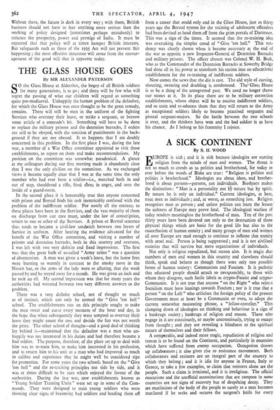THE GLASS HOUSE GOES
By SIR ALEXANDER PATERSON
S0 the Glass House at Aldershot, the bogey of all British soldiers for many generations, is to go ; and there will be few who will regret the passing of what our children will regard as something quite pre-mediaeval. Unhappily the human problem of the defaulter, for which the Glass House was once thought to be the great remedy, remains. There will still be men in the uniform of the fighting Services who overstay their leave, or strike a sergeant, or borrow some article of a comrade's kit. Something will have to be done to replace the military prisons and the detention barracks, if orders are still to be obeyed, with the sanction of punishment in the back- ground if they are not obeyed. It so happens that I am doubly concerned in this problem. In the first place I was, during the late war, a member of a War Office committee appointed to visit these establishments, to report on them and make recommendations. My position on the committee was somewhat paradoxical. A glance at my colleagues during our first meeting made it abundantly clear that I was the only civilian on the committee. As we exchanged views it became equally clear that I was at the same time the only member who had ever been a soldier—le„ marched both in and out of step, shouldered a rifle, fired shots in anger, and seen the inside of a guard-room.
In the second place it is lamentably true that anyone concerned with prison and Borstal finds his task inextricably confused with the problem of the indifferent soldier. For nearly all the entrants to these places have been in the Services, and the vast majority of them on discharge from cur care must, under the law of conscription, r,eturn to one or other of the Services. A prison or Borstal sentence thus tends to become a civil-law sandwich between two layers of Service in uniform. After hearing the evidence advanced for the benefit of the Wax Office committee, and visiting a number of prisons and detention barracks, both in this country and overseas, I was left with two very definite and fixed impressions. The first was that the great bulk of so-called "Army crime" was a question of absenteeism. A man was given a week's leave, but the home fires were burning so warmly in contrast to the smoky stove in the • Nissen hut, or the arms of the lady were so alluring, that the week passed by and he stayed away for a month. He was given an inch and he took an ell. My second impression was that for many years the authorities had wavered between two very different answers to the problem.
There was a very definite school, not of thought so much as of instinct, which can only be termed the "Give 'ern hell" school. The establishments run on this principle sought to make the men sweat and curse every moment of the hour and day, in the hope that when subsequently they were tempted to overstay their leave they might count the cost and decide the fun was not worth the price. The other school of thought—and a good deal of thinking lay behind it—maintained that the defaulter was a man who un- happily was not interested in his duties and had therefore become a bad soldier. The purpose, therefore, of the place set up to deal with him was to re-train him, to make him interested in his profession, and to return him to his unit as a man who had improved so much in calibre and experience that he might well be considered ripe for promotion. For some years the two schools based on the "Give 'em hell" and the re-training principles ran side by side, and it was at times difficult to be sure which enjoyed the favour of the authorities. During the late war, new establishments known as "Young Soldier Training Units" were set up in some of the Com- mands. They were designed to train young soldiers who were showing clear signs of becoming bad soldiers and heading them off
years ago the Borstal system for the training of adolescent offenders had been devised to head them off from the grim portals of Dartmoor. This was a sign of the times. It seemed that the re-training idea was overtaking the simpler creed of "Give. 'em hell." This ten- dency was clearly shown when it became necessary at the end of the war to appoint a new Inspector-General of Detention Barracks and military prisons. The officer chosen was Colonel W. H. Beak, who as the Commander of the Detention Barracks at Sowerby Bridge had done all in his power to transform his station into an educational establishment for the re-training of indifferent soldiers.
Now comes the news that the die is cast. The old style of cursing, shouting, sweating and doubling is condemned. Theo Glass House is to be a thing of the unregretted past. We need no longer throw our stones at it. In its place there are to be military correction establishments, whose object will be to receive indifferent soldiers, and so train and re-educate them that they will return to the Army as exceptional soldiers likely to become practised sergeants and pivotal sergeant-majors. So the battle between the two schools is over, and the thinkers have won and the bad soldier is to have his chance., As I belong to his fraternity I rejoice.


































 Previous page
Previous page